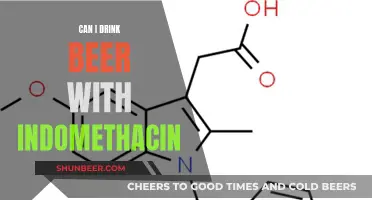
Alcohol has long been a topic of debate in the medical community, with some arguing that it can be beneficial for heart health, while others claim that it can lead to serious cardiovascular issues. Beer, being a popular alcoholic beverage, is often at the centre of this discussion. So, do people who drink beer have more heart problems? The answer is complex and depends on various factors such as the amount consumed, individual health history, and other lifestyle choices. While moderate beer consumption may not be detrimental to heart health, heavy drinking and binge drinking can lead to an increased risk of heart-related issues, including cardiomyopathy, irregular heart rhythms, and high blood pressure.
| Characteristics | Values |
|---|---|
| Moderate drinking defined as | 1 drink per day for women and 1-2 drinks for men |
| Heavy drinking defined as | More than 8 drinks per week for women and more than 15 drinks per week for men |
| Binge drinking defined as | 4 or more drinks for women and 5 or more drinks for men in about 2 hours |
| Alcohol's effect on heart health | Alcohol may help raise "good" cholesterol, prevent damage from "bad" cholesterol, and prevent blood from clotting. However, it can also lead to high blood pressure, heart failure, stroke, and irregular heartbeats. |
| Alcohol's effect on the heart rate | Alcohol can lead to a temporary jump in heart rate, causing tachycardia if it goes over 100 beats per minute. |
| Alcohol-induced cardiomyopathy | Alcohol can cause the heart to stretch and enlarge, weakening the heart muscle and reducing its ability to pump blood effectively. |
What You'll Learn

Alcohol-induced cardiomyopathy
The condition can affect anyone who consumes excessive alcohol, even those without an alcohol use disorder. However, it is more likely to occur in individuals with alcohol use disorders or genetic mutations that cause slower alcohol processing. Heavy drinking is defined as more than eight drinks per week for women and over 15 drinks per week for men, according to the CDC.
The symptoms of alcohol-induced cardiomyopathy include chest pain, fatigue, lightheadedness, heart palpitations, increased pressure in the neck veins, shortness of breath, edema, decreased appetite, loss of muscle mass, and swelling or hardening of the liver. These symptoms occur due to changes in the structure of the heart.
To diagnose alcohol-induced cardiomyopathy, doctors will perform a combination of diagnostic tests, review the patient's medical history, and assess their lifestyle and personal circumstances. Specific tests may include an echocardiogram, electrocardiography (ECG or EKG), a chest X-ray, a cardiac computed tomography (CT) scan, and heart magnetic resonance imaging (MRI).
Treatment for alcohol-induced cardiomyopathy involves reducing alcohol intake or completely abstaining from alcohol. Supportive care during alcohol withdrawal is crucial, as the symptoms can be severe or life-threatening. Medications such as beta-blockers and diuretics are also used to treat heart rhythm problems and other symptoms of heart failure. In some cases, pacemakers, implantable devices, or surgery may be necessary. The only cure for alcohol-induced cardiomyopathy is a heart transplant, but this option is usually not available due to the limited number of donor hearts.
The best way to prevent alcohol-induced cardiomyopathy is to drink in moderation or abstain from alcohol entirely. Heavy drinking can have serious health consequences, including liver disease, cancer, peptic ulcers, and diseases of the heart muscle, such as cardiomyopathy.
Mixing Beer and Muscle Relaxers: Is It Safe?
You may want to see also

HDL cholesterol levels
While beer drinking has been associated with a reduced risk of heart disease, the reasons for this are not entirely clear. Beer does not contain any natural cholesterol, but it can increase triglyceride levels in the blood. This is because beer contains carbohydrates and alcohol, which are substances that quickly raise triglycerides. Beer also contains phytosterols, plant compounds that bind to cholesterol and help remove it from the body. However, the levels of these compounds in beer are too low to have a significant cholesterol-reducing effect.
Some studies have shown that light to moderate alcohol intake may improve HDL ("good") cholesterol levels. HDL cholesterol helps sweep cholesterol deposits out of arteries, thereby protecting against heart attacks. However, heavy drinking is associated with elevated levels of LDL ("bad") cholesterol, total cholesterol, and triglycerides, as well as an increased risk of heart disease and related death.
The American Heart Association does not recommend starting to drink alcohol to lower cholesterol or improve heart health. Instead, they advise maintaining a healthy weight, eating a nutritious diet, and exercising regularly.
Beer After Dental Cleaning: What You Should Know
You may want to see also

Blood clotting
Drinking alcohol can have an impact on blood clotting. Alcohol acts as a blood thinner, reducing the blood's natural ability to form clots. While this may sound beneficial, it is important to remember that the risks associated with drinking alcohol outweigh any potential health advantages.
Alcohol interferes with the blood clotting process in two ways:
- It reduces the number of platelets in the blood, in part by interfering with blood cell production in the bone marrow.
- It makes the platelets less sticky, so they are less likely to clump together and form clots.
Drinking more than two servings of alcohol per day increases the risk of blood clots. This is because, despite the blood-thinning effects of alcohol, the body often triggers an increase in platelet production to counteract this effect, leading to a higher potential for clotting.
Who should avoid drinking alcohol?
- People with a history of blood clots or heart disease.
- Those with a family history of heart disease or blood disorders.
- Individuals taking prescription medication, including blood thinners.
- Pregnant women.
- People with a history of alcoholism.
Heavy drinking is linked to a number of negative health outcomes, including heart conditions. Excessive alcohol intake can lead to high blood pressure, heart failure, and stroke. It can also contribute to cardiomyopathy, a disorder that affects the heart muscle.
Alcohol-induced cardiomyopathy is a condition where long-term heavy alcohol use changes the shape of the heart, causing long-term damage and leading to heart failure. This happens because the heart muscles stretch and enlarge, weakening the heart and reducing its ability to pump blood effectively.
The American Heart Association (AHA) does not recommend drinking alcohol due to its risk of heart damage, including increased risk of blood clots. While moderate drinking is considered less harmful than excessive drinking, it is advised to avoid alcohol consumption altogether if there are concerns about cardiovascular health or blood clots.
Great Wolf Lodge: Beer Drinking Rules Explained
You may want to see also

High blood pressure
Heavy drinking is linked to a range of adverse health outcomes, including heart conditions. Excessive alcohol intake can lead to high blood pressure, which is the most common alcohol-related health problem. Drinking a lot of alcohol over time or too much on a single occasion can cause high blood pressure, also known as hypertension. This is because alcohol affects the muscles in your blood vessels, causing them to become narrower. When blood vessels are narrower, the heart must work harder to pump blood around the body, increasing blood pressure.
The more alcohol you consume, the higher the risk of developing hypertension. Regular drinking, especially if you're over 35, increases the risk, and just one drink a day can increase the likelihood of high blood pressure. High blood pressure can significantly increase the chance of chronic kidney disease and vascular dementia, caused by reduced blood flow to the brain.
Drinking less alcohol is the best way to lower your blood pressure. The American Heart Association recommends no more than two drinks per day for men and one drink per day for women. Generally, one drink equals 12 ounces of beer (containing 5% alcohol). However, it's important to note that even moderate drinking can cause high blood pressure in some people, so it's always good to be mindful of your consumption and consult a healthcare professional if you have any concerns.
Beer and Miscarriage: Can Drinking Cause Heavy Vaginal Bleeding?
You may want to see also

Heart rate
The link between alcohol consumption and heart health has been the subject of extensive research, with conflicting results. While some studies suggest that moderate drinking may offer some protection against heart disease, others indicate that alcohol consumption can negatively impact heart rate and contribute to heart problems.
The Impact of Alcohol on Heart Rate
Alcohol can cause an increase in heart rate, leading to a condition called tachycardia, where the heart rate exceeds 100 beats per minute. This elevated heart rate can have serious consequences, potentially resulting in heart failure or irregular rhythms, which are risk factors for heart attack and stroke.
Alcohol and Cardiomyopathy
Prolonged and excessive alcohol consumption is associated with alcoholic cardiomyopathy, a condition in which the heart undergoes structural changes, including stretching and enlargement. This weakening of the heart muscle impairs its ability to pump blood effectively, reducing the body's oxygen supply. Alcoholic cardiomyopathy can lead to long-term damage, including heart failure and severe complications.
Binge Drinking and Arrhythmias
Binge drinking, defined as consuming excessive amounts of alcohol within a short period, can cause arrhythmias or irregular heart rhythms. Both men and women are susceptible, with binge drinking defined as consuming four or more drinks for women and five or more drinks for men in about two hours. This disruptive effect on heart rhythm can have dangerous consequences for heart health.
Recommendations for Alcohol Consumption
While moderate drinking is generally considered acceptable for most individuals, excessive alcohol consumption is linked to an increased risk of heart problems. To maintain heart health, it is crucial to drink in moderation or abstain from alcohol altogether, especially for individuals with existing heart conditions or a history of heart problems.
In conclusion, while the impact of alcohol on heart rate is complex and influenced by various factors, excessive alcohol consumption is associated with an increased risk of heart rate irregularities and heart-related health issues. For individuals concerned about their heart health, it is essential to monitor alcohol intake and make informed decisions regarding their drinking habits.
Beer and Metformin: Is Light Beer Safe?
You may want to see also
Frequently asked questions
Drinking beer can have both positive and negative effects on heart health. While moderate drinking may offer some protection against heart disease by raising HDL ("good") cholesterol and preventing blood from clotting, heavy drinking is linked to an increased risk of heart conditions, including heart failure, stroke, and cardiomyopathy.
Moderate drinking is typically defined as one drink per day for women and one to two drinks per day for men. A drink is equivalent to 12 ounces of beer, 4-5 ounces of wine, or 1.5 ounces of 80-proof spirits.
Alcoholic cardiomyopathy (ACM) is a condition caused by excess or binge drinking, leading to heart muscle stretching and enlargement. This condition weakens the heart muscle, reducing its ability to pump blood effectively and causing long-term damage that can lead to heart failure and other severe problems.
Signs and symptoms of ACM include chest pain, especially during physical activity, fatigue or weakness, lightheadedness or fainting, heart palpitations, increased neck vein pressure and bulging, shortness of breath, edema (fluid buildup), decreased appetite, loss of muscle mass, and liver swelling or hardening.







